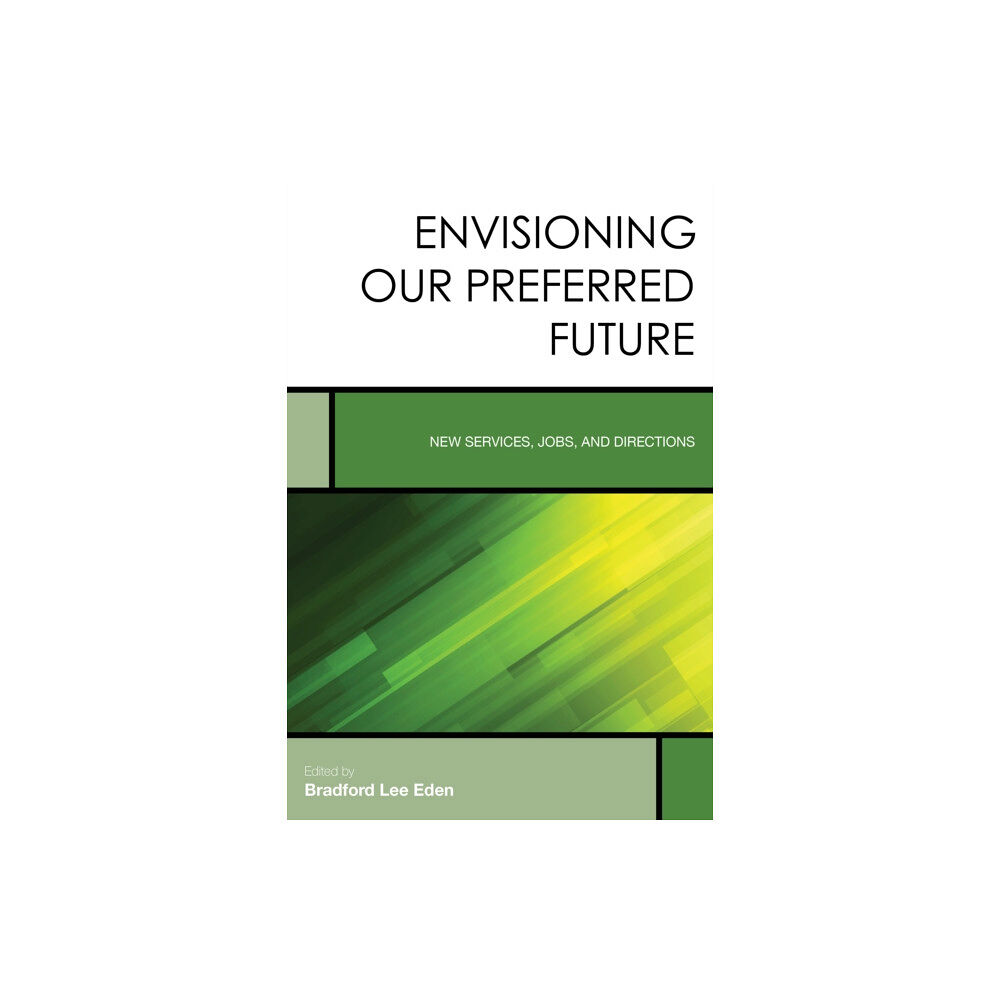- Hem
- Böcker
- Kurslitteratur
- Övrigt inom kurslitteratur
- Envisioning Our Preferred Future (häftad, eng)

Envisioning Our Preferred Future (häftad, eng)
Volume 8 of the series Creating the 21st-Century Academic Library is focused on new services, directions, job duties and responsibilities fo...
705 kr
739 kr
Bara 2 kvar
Skickas inom 4 - 5 vardagar
- Fri frakt
Fri frakt över 399:-
Snabb leverans
Alltid låga priser
Produktbeskrivning
Volume 8 of the series Creating the 21st-Century Academic Library is focused on new services, directions, job duties and responsibilities for librarians in academic libraries of the 21st century. Topics include research data management services, web services, improving web design for library interfaces, cooperative virtual reference services, directions on research in the 21st-century academic library, innovative uses of physical library spaces, uses of social media for disseminating scholarly research, information architecture and usability studies, the importance of special collections and archival collections, and lessons learned in digitization and digital projects planning and management.
Data management services are highlighted in the context of a consortium of smaller liberal arts and regional institutions who share a common institutional repository. Survey research plays a role in a number of chapters. One provides insight into how academic libraries are currently approaching web services, web applications, and library websites.
A second survey is used to explore the role of librarians as web designers, and provides detailed information related to job titles, job duties, time percentages related to duties, and other duties outside of web design. Comments of those surveyed are included and make interesting reading and a deeper understanding of this new function in libraries.
More generally, is a survey study exploring how librarians feel about the changes that are currently happening within the profession, as well as how these changes have personally affected their job duties and their current job assignments. Case studies are include one that features QuestionPoint in the context of a cooperative virtual reference service; another shows how research and scholarship can be disseminated using social media tools such as blogs, Twitter, ResearchGate and Google Scholar, among others; a other studies explore the importance of user engagement and buy-in before moving forward on digitization; and one shows how information architecture and usability emerge from the redesign of a public library website and whose successful completion involves user surveying, focus groups, peer site reviews, needs analysis, and usability testing.
Two chapters deal with the changing legal context: the importance and understanding of copyright and author rights in the 21st-century academic library, and the basics Family Educational Rights and Privacy Act (FERPA). It is hoped that this volume, and the series in general, will be a valuable and exciting addition to the discussions and planning surrounding the future directions, services, and careers in the 21st-century academic library
Data management services are highlighted in the context of a consortium of smaller liberal arts and regional institutions who share a common institutional repository. Survey research plays a role in a number of chapters. One provides insight into how academic libraries are currently approaching web services, web applications, and library websites.
A second survey is used to explore the role of librarians as web designers, and provides detailed information related to job titles, job duties, time percentages related to duties, and other duties outside of web design. Comments of those surveyed are included and make interesting reading and a deeper understanding of this new function in libraries.
More generally, is a survey study exploring how librarians feel about the changes that are currently happening within the profession, as well as how these changes have personally affected their job duties and their current job assignments. Case studies are include one that features QuestionPoint in the context of a cooperative virtual reference service; another shows how research and scholarship can be disseminated using social media tools such as blogs, Twitter, ResearchGate and Google Scholar, among others; a other studies explore the importance of user engagement and buy-in before moving forward on digitization; and one shows how information architecture and usability emerge from the redesign of a public library website and whose successful completion involves user surveying, focus groups, peer site reviews, needs analysis, and usability testing.
Two chapters deal with the changing legal context: the importance and understanding of copyright and author rights in the 21st-century academic library, and the basics Family Educational Rights and Privacy Act (FERPA). It is hoped that this volume, and the series in general, will be a valuable and exciting addition to the discussions and planning surrounding the future directions, services, and careers in the 21st-century academic library
| Format | Häftad |
| Omfång | 274 sidor |
| Språk | Engelska |
| Förlag | Rowman & Littlefield |
| Utgivningsdatum | 2016-05-09 |
| ISBN | 9781442266926 |
Specifikation
Böcker
- Format Häftad
- Antal sidor 274
- Språk Engelska
- Utgivningsdatum 2016-05-09
- ISBN 9781442266926
- Förlag Rowman & littlefield
Leverans
Vi erbjuder flera smidiga leveransalternativ beroende på ditt postnummer, såsom Budbee Box, Early Bird, Instabox och DB Schenker. Vid köp över 399 kr är leveransen kostnadsfri, annars tillkommer en fraktavgift från 39 kr. Välj det alternativ som passar dig bäst för en bekväm leverans.
Betalning
Du kan betala tryggt och enkelt via Avarda med flera alternativ: Swish för snabb betalning, kortbetalning med VISA eller MasterCard, faktura med 30 dagars betalningstid, eller konto för flexibel delbetalning.
Specifikation
Böcker
- Format Häftad
- Antal sidor 274
- Språk Engelska
- Utgivningsdatum 2016-05-09
- ISBN 9781442266926
- Förlag Rowman & littlefield
